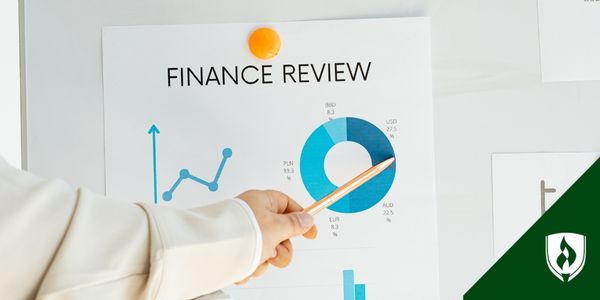Accountant vs. Financial Analyst: Choosing the Right Career for You
By Hope Rothenberg on 09/19/2024

You like numbers. You're a critical thinker. You're a great problem solver. You've got a good idea of what you're interested in pursuing, and two careers have caught your interest: accountant and financial analyst.
You're just not sure which one is a better fit for you.
To make your decision easier, here's a breakdown of some of the logistics of each career—and the preferences to consider as you look at the job options each industry has to offer.
Financial analyst vs. accountant: Choosing your fit
Choosing a career is about more than just checking off requirements and comparing data. It's also about finding day-to-day work that plays to your strengths, aligns with your working preferences and is part of a greater environment you can thrive in.
Before you dive into the education requirements, career path options or larger logistical concerns—let’s see which way you’re leaning based on your natural skills and preferences.
Here are some key aspects of working in each role, to help you determine which career might be a better fit for you.
If you want a predictable schedule...
Many financial analysts work full time, and some work more than 40 hours per week. Though this role will likely be a lot of work, you can generally expect a fairly-consistent schedule with standard working hours.1
If you prefer to change things up...
Most accountants also work full time, but the typical schedule is much more varied.
This is because the job will be busiest at certain times of the year—like during tax season or quarterly audits—while others will be much quieter. Most accountants can expect an intense workload with increased hours from about January through March, with a lighter load the rest of the year.2
If you want to work in an office...
Most financial analysts work in the office of their employer, whether it's a small business or a large financial corporation. They may also travel at times to visit other companies and client offices.1 If you want to work for one of a company's corporate finance departments and interact with coworkers and other finance professionals on a daily basis, becoming a financial analyst might be a good fit for you.
If you want to work from home...
While most accountants also work from offices, some; once they have gained necessary work experience, might find employment opportunities that enable them to work from home—and some are even self-employed.2 If you're seeking a career you can eventually do alone or on your own, accounting may be a good option.
Graduates of accounting programs who are new to the field should not expect to find a position where they can work from home right away. Those type of positions require related work experience.
If you're interested in business trends...
A huge part of a financial analyst's job is studying economic and business trends. Financial analysts focus on trends affecting a specific geographical region, industry or type of product—and it's part of their job to understand how market trends, new regulations, policies and political situations may affect investments.3 If this type of research and trend tracking sounds interesting to you, then financial analysis may be a match.
If you're interested in laws and regulations...
Accountants spend a lot of their time examining financial statements to ensure that they are accurate and comply with various laws and regulations. It'll be your job to comb through account books and accounting systems to confirm the use of accepted accounting procedures and identify any potential risks for fraud.4
If this type of legal know-how is appealing to you, accounting could be a match.
If you're good at seeing the big picture...
Using current and historical financial data, financial analysts examine a company’s financial statements and financial transactions to determine its overall value.3 This requires being able to look at granular numerical data, identify larger trends and then zoom out completely to form a big-picture business evaluation. If you're someone who's able to piece together knowledge and see the bigger picture, you may be a natural analyst.
If you're particularly detail-oriented...
Accountants need to pay attention to every detail when compiling and examining tax documents and financial records. Every number matters, and the ability to remain focused and alert through repetitive, detailed and time-consuming tasks is essential. Individuals who are meticulous, attentive and never miss a detail make some of the best accountants.
If you're a strong decision-maker...
At the end of the day, financial analysts are decision-makers at businesses and financial institutions. All of their research, investigative work and data analysis are ultimately meant to result in a conclusion that improves an organization's financial health.
Often, this conclusion comes in the form of a recommendation for whether a business should buy, hold or sell a security.3 And this means that financial analysts deal with a lot of important, high-pressure decisions. If you're confident in your work and able to stand by your decisions, you'll be a powerful analyst.
If you're highly organized...
Strong organizational skills are paramount for an accountant. Most accountants work with multiple clients at once, and each one requires a range of financial documents.4 Being able to organize and maintain what may very well be hundreds of financial records effectively and efficiently is key to an accountant's success.
If you're a good communicator...
While you may not associate communication skills with these two numbers-based careers, they're actually essential to both financial analysts and accountants. Accountants need to be good listeners and be able to discuss their work with clients verbally and in written reports.4 Translating complex accounting information into something their customers understand is key.
If a financial analyst can't communicate their findings and recommendations to clients, all that analysis is for nothing. Sharing their work with the appropriate stakeholders—whether it's face-to-face or written up—is a necessary skill that will make the role that much easier and more effective.
Accountant vs. financial analyst: Education requirements
The next step to choosing your career is seeing what's required for each pathway.
Accountant education requirements
Accountants typically need at least a bachelor’s degree in accounting or a related field to enter the occupation, according to the U.S. Bureau of Labor Statistics (BLS).5 Some employers prefer to hire applicants who have a master’s degree, while other employers may accept candidates with an associate’s degree for a junior accounting position—the requirements really come down to employer preference.
You've probably heard the term Certified Public Accountant (CPA). Many accountants choose to become CPAs to increase their job prospects, advance their careers or simply grow their client base. For some accountants, becoming a CPA may be required for their role. Any accountant who files a report with the Securities and Exchange Commission (SEC) is required to be a licensed CPA.5
There are also Certified Management Accountants (CMA®s). This type of accountant tends to work in the private sector, managing the accounts of businesses.
It might surprise you to learn there are actually many different types of accountants! Each path within accounting will have different education requirements. But most of them start with a bachelor’s degree.
For more on that, check out 9 Types of Accountants Who Do More Than Just Taxes.
Rasmussen University’s Accounting Certificate, Accounting Associate’s degree and Accounting Bachelor’s degree programs are not designed to prepare graduates for any state-issued professional license or certification. These programs do not meet all educational prerequisites for licensure as a Certified Public Accountant (CPA)in any state. Each state determines its own requirements for licensure as a Certified Public Accountant (CPA). In addition to other requirements, most states require a bachelor’s degree and no fewer than 225 quarter credits (150 semester credits) of coursework, specific in-field experience, and passing of the CPA licensing exam. Please consult with your state’s board of accountancy or equivalent oversight agency for further details. All of Rasmussen University’s accounting programs have not been approved by any state board of accountancy or other professional licensing agency.
Financial analyst education requirements
Similar to accountants, most entry-level positions for financial analysts require a bachelor’s degree in finance, according to the BLS. Some employers prefer to hire job candidates who have a master’s degree, though it's not required.6
In terms of certifications, the Financial Industry Regulatory Authority (FINRA) is the main licensing organization for the securities industry. A license is generally required to sell financial products, which may apply to some financial analyst positions.
It's worth noting that most of the licenses require sponsorship by an employer. Because of this, companies do not expect individuals to have these licenses before starting a job—but it is something that can be pursued after gaining some experience.6
Certification can be a great way to advance further in your financial analyst career, and there are a bunch of different options related to different roles and specialties. One example is the Chartered Financial Analyst® (CFA) certification from the CFA Institute®.
Financial analysts can become CFA certified if they have a bachelor’s degree, several years of work experience and pass the required exams.6
For more about how this role works, check out What Does a Financial Analyst Do? Beyond the Numbers.
Accountant vs. financial analyst: Job outlook
Choosing a career path involves some thought about the future of your chosen industry, too. Here are some big-picture statistics to keep in mind about where each job market is headed over the next decade or so.
Accountant job outlook
The employment of accountants is projected to grow six percent from 2023 to 2033, which is about as fast as the average for all occupations. An average of 130,800 job openings for accountants are projected per year over the decade.7
Factors like globalization, economic growth and a complex tax and regulatory environment will all continue to lead to demand for accountants.
More accountants will be needed to examine financial records for growing companies, provide financial documentation for an increasing number of companies going public and provide services related to international business mergers and acquisitions in the face of an increasingly global economy.7
Just like every industry in today's world, technological change will be a factor. Certain routine accounting tasks may be automated over time, but this is expected to increase accountants' efficiency rather than reduce overall demand.7
Financial analyst job outlook
The employment of financial analysts is projected to grow nine percent from 2023 to 2033, which is faster than the average for all occupations. An average of 30,700 job openings for financial analysts are projected per year over the decade.8
The demand for financial analysts is expected to increase alongside overall economic activity. More financial analysts will be needed as businesses expand and new businesses are established. As new markets continue to emerge around the world, more professionals will be needed in additional geographic regions.8
In terms of technology, demand for financial analysts is projected to grow as big data and other technological developments require analyses. Financial analysts will help cutting-edge businesses manage their finances, identify investment trends and deliver new products or services to their clients.8
Which role is the best fit for you?
Now that you know a little bit about both accountants and financial analysts, get a little deeper into the career that interests you most.
If accounting sounds good to you, check out: 10 Accounting Pros and Cons to Consider—Before You Make it Your Major.
If financial analyst piques your curiosity, see: 9 Signs You Have What It Takes to Major in Finance.
Chartered Financial Analyst® is a registered trademark of CFA INSTITUTE
CFA Institute® is a registered trademark of CFA INSTITUTE
Certified Management Accountant® is a registered trademark of Institute of Certified Management Accountants
1Bureau of Labor Statistics, U.S. Department of Labor, Occupational Outlook Handbook, Financial Analysts, [accessed Aug 20, 2024] Financial Analysts : Occupational Outlook Handbook: : U.S. Bureau of Labor Statistics (bls.gov)
2Bureau of Labor Statistics, U.S. Department of Labor, Occupational Outlook Handbook, Accountants and Auditors(put date accessed as [e.g. Aug. 29, 2024], www.bls.gov/ooh/business-and-financial/accountants-and-auditors.htm#tab-3
3Bureau of Labor Statistics, U.S. Department of Labor, Occupational Handbook, Financial Analysts, (place date accessed e.g. [Aug. 29, 2024]), www.bls.gov/ooh/business-and-financial/financial-analysts.htm#tab-2
4Bureau of Labor Statistics, U.S. Department of Labor, Occupational Handbook, Accountants and Auditors, [accessed Aug 20, 2024], Accountants and Auditors : Occupational Outlook Handbook: : U.S. Bureau of Labor Statistics (bls.gov)
5Bureau of Labor Statistics, U.S. Department of Labor, Occupational Outlook Handbook, Accountants, and Auditors, [accessed Aug 20, 2024], Accountants and Auditors : Occupational Outlook Handbook: : U.S. Bureau of Labor Statistics (bls.gov).
6Bureau of Labor Statistics, U.S. Department of Labor, Occupational Outlook Handbook, Accountants, and Auditors, [accessed Aug 20, 2024], Accountants and Auditors : Occupational Outlook Handbook: : U.S. Bureau of Labor Statistics (bls.gov) #tab-6
7U.S. Department of Labor, Occupational Outlook Handbook, Financial Analysts, [accessed Aug 20, 2024] Financial Analysts : Occupational Outlook Handbook: : U.S. Bureau of Labor Statistics (bls.gov) #tab-6
8Bureau of Labor Statistics, U.S. Department of Labor, Occupational Outlook Handbook, Financial Analysts, [accessed Aug 20, 2024], Financial Analysts : Occupational Outlook Handbook: : U.S. Bureau of Labor Statistics (bls.gov)




